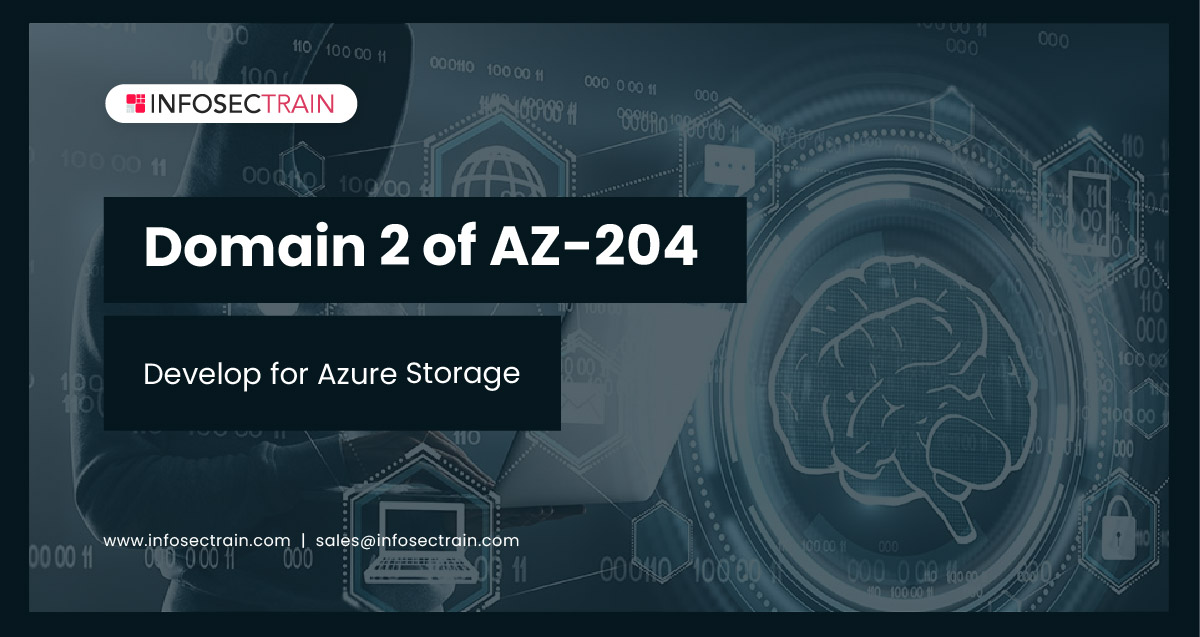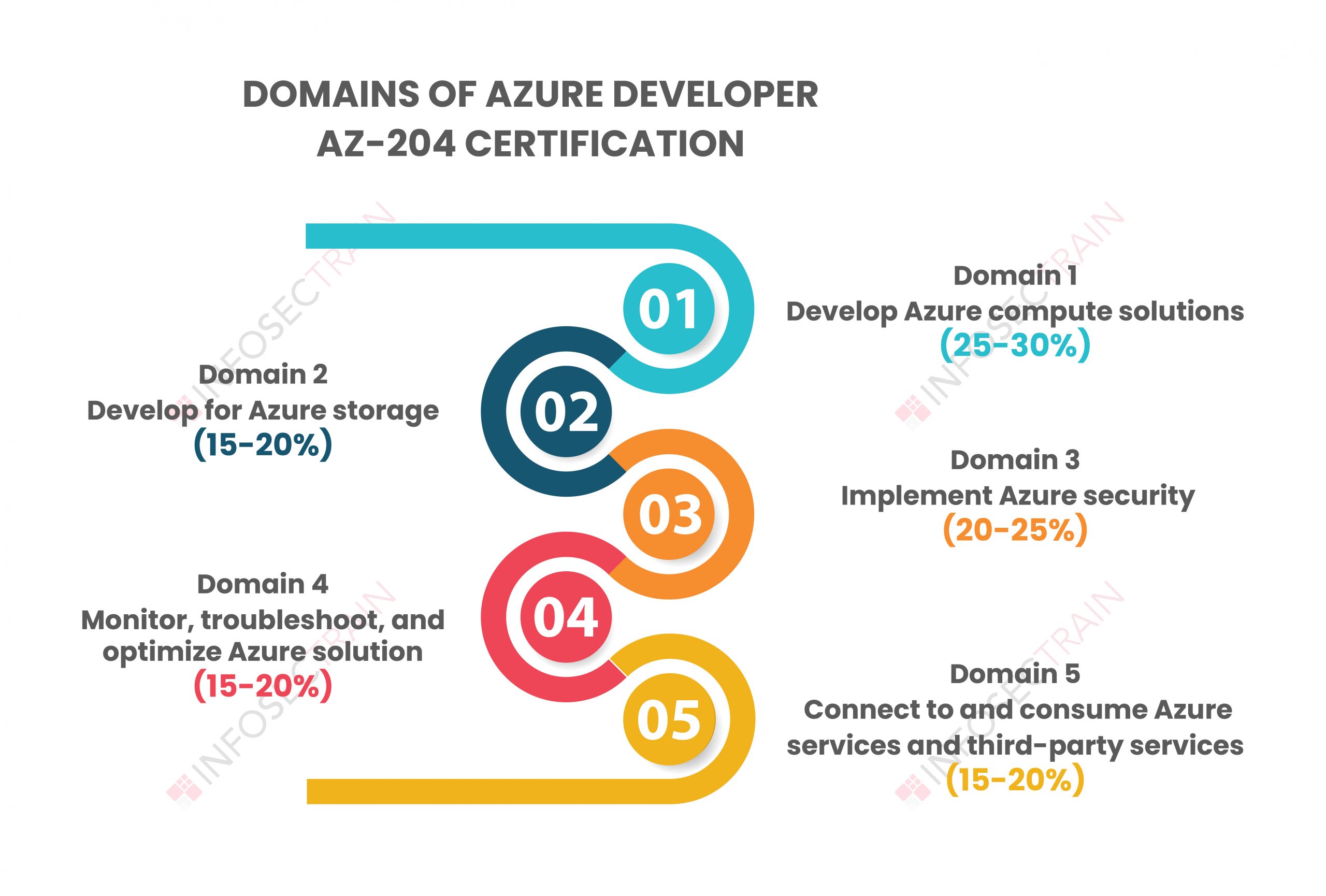Domain 2 of AZ-204: Develop for Azure Storage

Table of Contents
Types of Azure Storage
Domain 2 of AZ-204: Develop for Azure storage
Develop solutions that use Cosmos DB storage
Develop solutions that use blob storage
Azure Storage is a cloud-based platform for modern applications. As we know, the amount of data is increasing day after day; so we need to upgrade our storage solutions as well. Azure Storage is a cloud-based file system solution that provides a massively scalable object store for data objects. It offers massive security, durability, accessibility, and other benefits. Users or client applications access Azure Storage data items from anywhere globally through HTTP or HTTPS.
Types of Azure Storage
With additional disk storage, there are five primary components of Azure Storage:
Azure blob storage: It is designed to store large amounts of unstructured data. Large binary objects are used for storage (BLOBs).
Azure table storage: It has now been included in Azure Cosmos DB. Structured NoSQL data is stored in an Azure table.
Azure file storage: It’s a fully managed file sharing service that runs on the Server Message Block (SMB) protocol and may be used in the cloud or on-premise.
Azure queue storage: It is a message storage service that may access through HTTP or HTTPS from anywhere in the world.
Disk storage: There are two virtual hard disks (VHDs) types: managed and unmanaged.
Azure Developer AZ-204 certification comprises a total of five domains:

- Domain 1: Develop Azure compute solutions (25-30%)
- Domain 2: Develop for Azure storage (15-20%)
- Domain 3: Implement Azure security (20-25%)
- Domain 4: Monitor, troubleshoot, and optimize Azure solutions (15-20%)
- Domain 5: Connect to and consume Azure services and third-party services (15-20%)
In this article, we will discuss the second Domain of AZ-204, “Develop for Azure storage.”
Domain 2 of AZ-204: Develop for Azure storage
We all know that storage is a necessary component of your Microsoft Azure apps, and this course will prepare you on how to use it effectively. This domain comprises (15-20%) weightage. In this domain, we will train Azure developers to write code and build solutions that work smoothly with Azure Storage, optimize database consumption, and automatically create, read, update, and delete tables. You will learn how to make a storage container in Azure. This domain will introduce you to developing solutions that use the Cosmos DB storage system and blob storage system.
The AZ-204, “Develop for Azure storage” certification exam’s second domain includes the following subtopics:
1. Develop solutions that use Cosmos DB storage
Cosmos DB is an Azure premium storage solution that satisfies your need for a globally distributed, low-latency, highly responsive and always-online database. In this section, first, you’ll learn to choose the appropriate API for your project and interact with data with the accurate SDK. You’ll learn how to create Cosmos DB containers and populate them with data. Then, you’ll learn how to set up throughput and partitioning for optimal performance. In this section, you’ll also learn how to choose the appropriate consistency level for your operations. Finally, you’ll learn to use triggers, stored procedures, and change feed notifications to perform server-side handling.
Azure Cosmos DB
Azure Cosmos DB allows you to run a distributed NoSQL database with low latency and excellent throughput. It differs from a traditional relational database, which has a table with a defined number of columns and requires each row to follow the table’s scheme. It enables you to control your data even if it is stored in data centers located all over the world. It has a single backend that can handle numerous data models for document, key-value, relational, and graph models.
2. Develop solutions that use blob storage
Azure Blob storage provides layered, highly available storage for structured and unstructured data. Unstructured data does not follow a specific model or definition, such as text or binary data. In this section, you’ll learn about Azure’s Blob storage possibilities and how to choose the right tools for moving items between storage accounts and containers. You’ll discover how to use the SDK to interface with data and control storage container characteristics and metadata. Finally, you’ll learn how to use Azure Blob storage to archive data, distinguish between the hot, cold, and archive access levels, and retrieve offline stored data.
| Related Article: How to Prepare for the AZ-204 |
Azure Blob Storage
Azure blob storage is essential for the overall Microsoft Azure platform because many other Azure services will store data in a storage account inside the blob storage and act on that data. Furthermore, each blob should be kept in its own container. The container is more akin to a folder containing various blobs.
Developing solutions for Microsoft Azure with InfosecTrain
Instructor-led training for AZ-204 from InfosecTrain is exactly what you need. With our well-versed and experienced trainers, we are among the leading training providers around the globe. They will assist you in grasping the fundamental principles and providing a thorough understanding of the subject. The Azure training course is well worth every dollar and minute you put into it.







 1800-843-7890 (India)
1800-843-7890 (India)